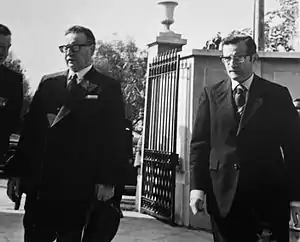Ismael Moreno Pino
Ismael Moreno Pino (15 February 1927 – 15 August 2013) was a Mexican lawyer, senior diplomat and author who served as Deputy Minister of Foreign Affairs and Ambassador of Mexico.[1]
Ismael Moreno Pino | |
|---|---|
.jpg.webp) | |
| Deputy Minister of Foreign Affairs (for Multilateral Affairs and Human Rights) | |
| In office 1964–1965 | |
| President | Adolfo López Mateos Gustavo Díaz Ordaz |
| Preceded by | Alfonso García Robles |
| Succeeded by | María Emilia Téllez Benoît |
| Ambassador of Mexico to the Netherlands | |
| In office 1986–1990 | |
| President | Miguel de la Madrid Carlos Salinas de Gortari |
| Preceded by | Roberto Casellas Leal |
| Succeeded by | Ezequiel Padilla Couttolenc |
| Ambassador of Mexico to Germany | |
| In office 1972–1975 | |
| President | Luis Echeverría Álvarez |
| Preceded by | Antonio Ruiz Galindo |
| Succeeded by | Luis Weckmann Muñoz |
| Ambassador of Mexico to Chile | |
| In office 1965–1972 | |
| President | Gustavo Díaz Ordaz Luis Echeverría Álvarez |
| Preceded by | Gustavo Ortiz Hernán |
| Succeeded by | Gonzalo Martínez Corbalá |
| Assistant Secretary of State for International Organization Affairs | |
| In office 1961–1964 | |
| President | Adolfo López Mateos |
| Preceded by | Jorge Castañeda y Álvarez de la Rosa |
| Succeeded by | María Emilia Téllez Benoît |
| Personal details | |
| Born | 15 February 1927 Mérida, Yucatán, Mexico |
| Died | 15 August 2013 (aged 86) Mexico City |
| Nationality | Mexican |
| Political party | Independent |
| Spouse(s) | Guadalupe Mercedes González de Hermosillo y Quirós |
| Children | Patricia Ismael María de Lourdes |
| Parents | Aida Pino Cámara (mother) Ramón Moreno Sánchez (father) |
| Relatives | María Cámara Vales (grandmother) José María Pino Suárez (grandfather) Alejandro Lecanda Moreno (grandson) |
| Education | American School Foundation |
| Alma mater | Universidad Nacional Autónoma de México (LL.B) Georgetown University (MSFS) |
| Profession | Lawyer Statesman Diplomat Author |
Born in Mérida, Yucatán into a socially prominent family that had had a distinguished participation in Liberal politics during most of the 19th century and early 20th century, his grandparents were María Cámara Vales, recipient of the 1969 Belisario Domínguez Medal of Honor, and José María Pino Suárez, the lawyer and statesman who served as Vice President of Mexico between 1911 and his assassination in 1913.
After studying at the American School Foundation in Mexico City, he graduated with a Law degree from Universidad Nacional Autónoma de México (1945–49) and carried out postgraduate studies at the Edmund A Walsh School of Foreign Service at Georgetown University in Washington, D.C. (1950–52).
After joining the Foreign Office in 1951, he served as Assistant Secretary of State for of Western Hemisphere Affairs (1952–1958), Assistant Secretary of State for International Organization Affairs (1960–1964) and Under-Secretary of State for Multilateral Affairs and Human Rights (1964–1965).
A career diplomat, he was appointed to the rank of Ambassador in 1964, representing his country before various organizations and countries such as, Germany, the Kingdom of the Netherlands, Chile, Peru, the United Nations in New York, the Organization of American States in Washington, D.C. and the international organizations of the United Nations in Geneva, Switzerland. Between 1990 and 1992, he served as a foreign policy adviser to President Carlos Salinas de Gortari. He remained politically independent throughout his career, refusing to ever join any political party.
In 1982, President José López Portillo appointed him to the lifetime rank of Eminent Ambassador of Mexico (embajador eminente), a special honour reserved by law for a maximum of ten diplomats who are considered to have rendered a particularly distinguished contribution to Mexico's Foreign Policy. Prior to retiring in 1992, he had the distinction of being the Head of the Diplomatic Service, ranking as the most senior ambassador in Mexico's Foreign Service.
During his career, he played an important role in the disarmament conference which culminated in the signing of the Treaty of Tlatelolco (1969) which prohibited nuclear weapons in Latin America and the Caribbean, serving as a delegate in the OPANAL conferences and collaborating closely with Alfonso Garcia Robles, who in 1982 won the Nobel Peace Prize for their efforts. The author of several treatises on International Relations and International Law, he is nowadays particularly remembered for his authorship of Diplomacy (1998) which has educated generations of diplomats in Latin America.
Family
.jpg.webp)
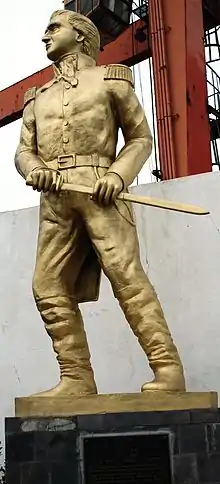
He was born in a house in the Paseo de Montejo in Merida, Yucatan, on 15 February 1927. His father was Ramón Moreno Sánchez, a wealthy financier and landowner, and his mother was Aida Pino Cámara.
His maternal grandparents were María Cámara Vales, recipient of the Belisario Domínguez Medal, while his paternal grandfather was José María Pino Suárez a lawyer and statesman who served as governor, cabinet secretary and vice-president of the Republic.
Moreno Pino is a descendant of the aristocratic Cámara family, which was one of the most conspicuous of the so-called Yucatecan "divine castes" which controlled much of political, social and economic life in the Yucatán Peninsula from the Spanish Conquest of Yucatán right up to the Mexican Revolution; his ancestor, the conqueror and nobleman (hidalgo), Juan de la Cámara (1525-1602), was one of the founders of Mérida in the 16th century. From this branch, Moreno Pino descends from several of the Spanish conquistadors who participated in the Conquest of Yucatan, including Francisco de Montejo.[2]
Among his great-uncles are Nicolás Cámara Vales, who was a former Governor of Yucatán and Alfredo Cámara Vales, who was a former Governor of Quintana Roo. Likewise, his great-uncle was Agustín Vales Castillo, industrialist, banker, and political leader of Mérida during the henequen boom.[3]
Moreno Pino is also a descendant of Joaquín Baranda, a long serving cabinet minister (1882-1901), who was Secretary of Foreign Affairs, Justice and Education. He also descends from Joaquín Casasús, a lawyer, banker and economist who, in addition to being the richest man in Mexico in the early 20th century, was president of the Mexican Academy of the Language and served as the Mexican Ambassador to the United States in the early 20th century.
Among his most remote ancestors, is Pedro Sainz de Baranda y Gorriti, who served as Mayor of Madrid during the Napoleonic invasion of Spain and was responsible for organizing the city's defenses. Likewise, he is a descendant of Pedro Sáinz de Baranda y Borreiro,[4] a Spanish industrialist, politician and naval officer who, having fought in the Battle of Trafalgar and the Siege of San Juan de Ulúa, is widely credited as the founder of the Mexican Navy; he is also believed to have introduced the Industrial Revolution to the country. Moreno Pino is also a descendant of Pedro Moreno González Hermosillo, another hero of the Mexican War of Independence.
Education

A graduate of the American School Foundation in Mexico City, he also studied agricultural engineering at Texas A&M University.
He went on to study at the Faculty of Law, Universidad Nacional Autónoma de México, graduating with a law degree in 1950, with the thesis "El cuerpo consular mexicano al servicio del plan nacional de recuperación económica" (the role of the consular corps in the national economic recovery plan).[5] He subsequently became a fully qualified lawyer.
He completed his education at the Edmund A. Walsh School of Foreign Service at Georgetown University (1950–52), where he earned a Master of Science in Foreign Service.
Career
.jpg.webp)
Between 1945 and 1950, during his law studies, he was a law clerk for Chief Justice Anastacio López Sánchez of the National Supreme Court of Justice of Mexico.
He joined the Foreign Office in 1951 and the Foreign Service in 1955, after passing the necessary examinations.[6] Originally, he was hired as a legal advisor to the Mexican delegation to the Organization of American States in Washington, D.C.
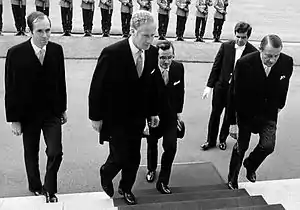
Returning to Mexico, he served as Assistant Secretary of State for Western Hemisphere Affairs (1952–58) and, succeeding Jorge Castañeda y Álvarez de la Rosa, he was Assistant Secretary of State for International Organization Affairs (1960–64). Between 1964 and 1965, he served as Under-Secretary of State for Multilateral Affairs and Human Rights.
During his time heading the Office of International Organization Affairs, he was a delegate at the Ministerial Conference of the OAS held in Punta del Este in 1962, during which the decision was taken, after the Cuban Revolution and contrary to the wishes of the United States, not to expel Cuba from the OAS. During the ministerial conference, the role of Mexico was crucial in advocating for non-interventionism, according to the Estrada Doctrine.[7]
In 1964, President Gustavo Diaz Ordaz named him to the rank of Ambassador Extraordinary and Plenipotentiary, becoming, at the time of his appointment, the youngest ambassador in the foreign service.
In 1965, he presented his letters credence to President Eduardo Frei Montalva at the La Moneda Palace in Santiago de Chile. In 1970, he was witness to the ascension of Salvador Allende to the presidency, and he left Chile in 1972, only months before the 1973 Chilean coup d'état which overthrew Allende.
During this period, he served on two occasions as the dean of the diplomatic corps in absentia of the Apostolic Nuncio. It was in this role that he received increased pressure to visit and congratulate Allende for his victory in the 1970 Chilean presidential election, in representation of the entire diplomatic corps. Moreno Pino wanted to avoid congratulating the socialist candidate until his victory was official, so as not to appear to be unduly intervening in Chilean politics or in the electoral process. However, as the Christian Democrats, the governing party, increasingly showed their will to avoid new electoral phases, and after certain Ambassadors (mostly from Warsaw Pact countries) bypassed him and congratulated Allende directly, Moreno Pino took the decision to visit Allende and congratulate him in person so as to in order to avoid a loss of his authority as dean.
After Allende was sworn in, Moreno Pino once again found himself in a delicate position, as he had to offer a gala dinner which is traditionally offered by the diplomatic corps for the new president of the republic. However, due to the Marxist ideology of Allende (disapproving of bourgeoisie entertainment) and the lack of enthusiasm that several western nations had regarding his accession, “he had to carry out complex maneuvers to ensure that the event was carried out.” [6]
In 1972, Luis Echeverria carried out a prolonged visit to Chile during which he was hosted by Ambassador Moreno Pino and his family in the Ambassadorial residence. During the visit, Echeverria communicated to Moreno Pino that he had taken the decision to name him as Ambassador in the Federal Republic of Germany, where Moreno Pino would be responsible, amongst other things, for handing over the Olympics (held in Mexico City in 1968) to Germany, which was set to host the 1972 Summer Olympics held in Munich.
_docks_in_Lima%252C_Peru.jpg.webp)
After his initial posting in Santiago, Moreno Pino served in Bonn, Washington, D.C., Geneva, Caracas, Lima, The Hague and briefly in Santo Domingo. In 1990, he was recalled to Mexico in order to act as a senior foreign policy adviser to president Carlos Salinas de Gortari.
During the course of his career, he developed into one of the most eminent policy experts in the Foreign Office on western hemisphere affairs. He was a key advisor and actively participated on the drafting of the amendments which were carried out to the Inter-American Treaty of Reciprocal Assistance (TIAR) under the Buenos Aires Protocol (1967), the San José Protocol (1975) and in the Cartagena de Indias Protocol (1985).
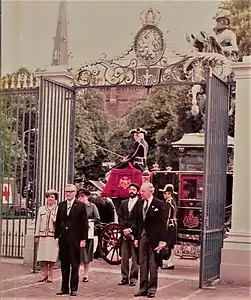
Throughout his career, he was a delegate in over fifty international conferences on various issues ranging from disarmament to reciprocal assistance; on many occasions, he served as a delegate in the United Nations General Assembly in New York.
He was the Secretary General of the Mexican Delegation to the First United Nations Conference on the Law of the Sea, held in Geneva, Switzerland between February and April 1958. The conference was important in establishing the modern legal framework of the law of the sea.
He was also a Lecturer of International Law at Georgetown University, the Mexico City College and Instituto Matias Romero.
In August 2013, José Antonio Meade, the Foreign Secretary, informed that Ambassador Moreno Pino had died. After giving his condolences to his family, he declared that Moreno Pino had contributed during his career to strengthen the good name of Mexican diplomacy.[8]
Books
He is the author of the following books:
- Origins and Evolution of the Inter-American System (1977) (In Spanish: Orígenes y evolución del sistema interamericano);
- Diplomacy: Theoretical and Practical Aspects (1996) (In Spanish: La diplomacia: aspectos teoricos y prácticos de su ejercicio profesional); and
- Law and Diplomacy in Inter-American Relations (1998) (In Spanish: Derecho y diplomacia en las relaciones interamericanas).
Personal life
In February 1963, Moreno Pino married Mercedes González de Hermosillo y Quirós, the eldest daughter of Airforce General Bernardo González de Hermosillo y Ríos, a pioneer of aviation in Mexico and a founding member of the Airforce College (Escuela Militar de Aviación). The couple had three children:
- Patricia Moreno Hermosillo.
- Ismael Moreno Hermosillo.
- Lourdes Moreno Hermosillo
He also had a grandchild, Alejandro Lecanda Moreno.
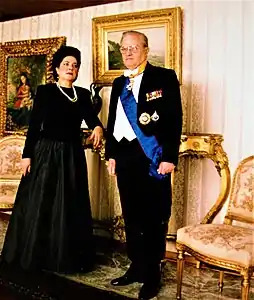
Honors
Throughout his diplomatic career, Moreno Pino was awarded several honors from foreign nations:
 Order of the Sacred Treasure, Second Class, Gold and Silver Star, awarded by H.I.M. Hirohito, The Emperor of Japan.
Order of the Sacred Treasure, Second Class, Gold and Silver Star, awarded by H.I.M. Hirohito, The Emperor of Japan. Knight Grand Cross of the Order of Orange-Nassau, awarded by H.R.M Beatrix, The Queen of the Netherlands.
Knight Grand Cross of the Order of Orange-Nassau, awarded by H.R.M Beatrix, The Queen of the Netherlands. Order of Merit of the Federal Republic of Germany, Special class of the Grand Cross, awarded by H.E. Gustav Heinemann, The President of Germany.
Order of Merit of the Federal Republic of Germany, Special class of the Grand Cross, awarded by H.E. Gustav Heinemann, The President of Germany. : Grand Collar of the Order of Merit (Chile), awarded by H.E. Salvador Allende, The President of Chile.
: Grand Collar of the Order of Merit (Chile), awarded by H.E. Salvador Allende, The President of Chile. : Grand Officer of the Order of the Southern Cross, awarded by H.E. Juscelino Kubitschek, The President of Brazil.
: Grand Officer of the Order of the Southern Cross, awarded by H.E. Juscelino Kubitschek, The President of Brazil. Grand Cross with Diamonds of the Order of the Sun of Peru, awarded by H.E. Alan García, The President of Peru.
Grand Cross with Diamonds of the Order of the Sun of Peru, awarded by H.E. Alan García, The President of Peru. Order of the Yugoslav Star, Great Star, awarded by H.E. Marshal Josip Broz Tito, The President of Yugoslavia.
Order of the Yugoslav Star, Great Star, awarded by H.E. Marshal Josip Broz Tito, The President of Yugoslavia. Order of the Liberator, Grand Cordon (First Class), awarded by H.E. Luis Herrera Campins, The President of Venezuela.
Order of the Liberator, Grand Cordon (First Class), awarded by H.E. Luis Herrera Campins, The President of Venezuela. Order of Brilliant Star, Grand Cordon (First Class), awarded by H.E. Chiang Kai-shek, The President of the Republic of China.
Order of Brilliant Star, Grand Cordon (First Class), awarded by H.E. Chiang Kai-shek, The President of the Republic of China.
Bibliography
- Moreno Pino, Ismael. Orígenes y evolución del sistema interamericano. Tlatelolco, México: Secretaría de Relaciones Exteriores, 1977. OCLC 4041498 [9]
- Moreno Pino, Ismael. La diplomacia: aspectos teoricos y prácticos de su ejercicio profesional. México: Secretaría de Relaciones Exteriores, 2001. ISBN 978-968-16-5234-0 [10]
- Moreno Pino, Ismael. Derecho y diplomacia en las relaciones interamericanas. Mexico, D.F.: Secretaría de Relaciones Exteriores, Fondo de Cultura Económica, 1999. ISBN 978-968-16-5995-0 [11]
References
| Wikimedia Commons has media related to Ismael Moreno Pino. |
- Revista mexicana de política exterior, v.59–60
- Valdés Acosta, José María (1979). A Través de las Centurias. Talleres Litográficos de la Impresora Bravo.
- "María Cámara Vales, viuda de Pino Suárez" (PDF).
- "José María Pino Suárez, la errada lealtad".
- WorldCat
- "Ismael Moreno Pino, embajador eminente" (PDF). Archived from the original (PDF) on 15 June 2013.
- "La exclusión de Cuba de la Organización de Estados Americanos: los desacuerdos diplomáticos entre México y Estados Unidos en 1962" (PDF).
- "Muere Embajador Eminente de México". Archived from the original on 16 January 2014. Retrieved 15 January 2014.
- WorldCat
- WorldCat
- WorldCat
